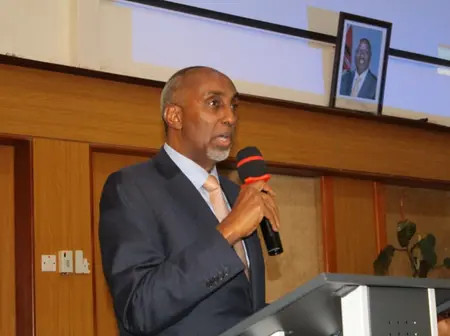Nairobi, Kenya: No medicine. No fair shot. No service without a bribe. When integrity vanishes, this is what’s left. This is the lived reality for millions of Kenyans, and it’s a story that needs to be told.
It is these everyday frustrations that the Kenya Leadership Integrity Forum (KLIF) hopes to address with the launch of the Kenya Integrity Plan 2023–2028, a five-year roadmap designed to strengthen governance, rebuild trust, and embed ethical leadership across the country.
The launch, themed “Realizing Kenya’s Good Governance Vision through the Kenya Leadership Integrity Forum,” brought together leaders from the Ethics and Anti-Corruption Commission (EACC), civil society, and the private sector, all united by a shared resolve to turn integrity into a lived reality.
EACC Chairperson Dr. David Oginde reminded leaders that integrity is the foundation of governance, not an optional virtue. “Good governance is not built on policies alone; it is anchored on integrity. If our leaders do not embody honesty and accountability, then public trust in institutions will remain broken,” he said.
His message was echoed by EACC CEO Mr. Abdi A. Mohamud, who emphasized that the plan is aligned with Vision 2030 and the Bottom-Up Economic Transformation Agenda, making integrity central to economic growth and public service delivery.
The Kenya Integrity Plan rests on four promises, each one touching the everyday lives of citizens.
The first is closing institutional loopholes. This is not just about adjusting systems on paper; it means that when funds are set aside for classrooms, they actually build classrooms, and when budgets are allocated to clinics, they translate into stocked facilities rather than stalled projects.
The second promise is holding leaders accountable. Here, accountability goes beyond legal jargon. It is about communities finally receiving clean water, electricity, and roads without watching resources disappear into private pockets.
The third is involving citizens in oversight. By giving Kenyans, especially young people, the tools and space to monitor public spending, governance stops being a closed-door affair and becomes a shared responsibility where citizens themselves can demand answers.
The fourth promise is promoting ethics in enterprise, creating an environment where businesses grow through hard work and innovation rather than backdoor deals. It envisions a Kenya where young tech innovators in Nairobi secure funding without kickbacks, jua kali artisans in Kisumu win tenders on merit, and small traders in Eldoret register businesses without being trapped in red tape. In short, ethical enterprise means a fair playing field where merit, creativity, and diligence are the true currency of success.
Dr. Josephine Monyi, Head of the National Integrity Academy, speaking at the event.It is on this last point, the values that drive leaders and institutions, that Dr. Josephine Monyi placed her emphasis. “Integrity should not be a slogan on a wall; it must be a habit in the way leaders think, decide, and serve,” said the Head of the National Integrity Academy. For her, the four promises can only take root if leaders are trained not just to understand integrity, but to live it in their daily decisions.
The forum also highlighted the role of young people, with voices like that of Siomboa Kiyoko underscoring the link between innovation, mentorship, and ethical growth. By equipping more than 3,000 boys with skills and guidance, her foundation demonstrates how nurturing the youth ensures integrity becomes part of their growth journey.
To illustrate what this plan envisions, imagine a young graduate applying for a government internship. Instead of being asked for a “token of appreciation” to move their application forward, they are evaluated purely on merit. Picture a small business owner in Eldoret competing for a county tender; instead of losing out to a well-connected bidder, their honest proposal is given a fair chance.
These are the changes the Kenya Integrity Plan is designed to deliver: a shift from corruption as an expectation to integrity as the norm.
The launch of the Kenya Integrity Plan 2023–2028 signals a renewed determination to confront corruption at every level. For Kenyans, its success will not be judged by speeches or documents but by visible changes in medicine reaching hospitals, bursaries awarded fairly, and services delivered without delay.
As the forum closed, KLIF and its partners pledged to ensure that integrity is not only spoken about but lived daily, from the highest offices in government to the smallest interactions in our communities.

Leave a Reply